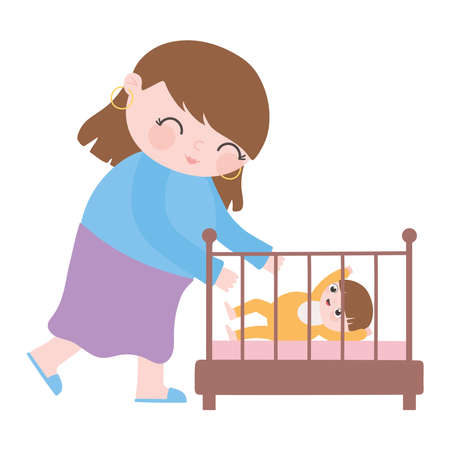Understanding Newborn Sleep Patterns
Welcoming a newborn into your family is both exciting and overwhelming, especially when it comes to understanding their sleep needs. Unlike older babies and toddlers, newborns in the UK typically have very different sleep cycles that reflect their rapid development. In the earliest weeks, a newborn’s sleep is scattered throughout the day and night, often without any predictable pattern. This irregularity is entirely normal as their circadian rhythm—the internal clock that helps regulate sleep—has not yet matured.
Newborn vs Older Infant Sleep Cycles
| Newborn (0-3 months) | Older Infant (4+ months) | |
|---|---|---|
| Average Total Sleep Needed | 14-17 hours per 24 hours | 12-15 hours per 24 hours |
| Longest Sleep Stretch | 2-4 hours at a time | 6-8 hours at night |
| Daytime Naps | Frequent, short naps (up to 8) | Fewer, longer naps (2-3) |
The Importance of Sleep for Brain and Emotional Development
Sleep plays a vital role in supporting your baby’s brain growth and emotional wellbeing. During sleep, particularly deep sleep stages, essential processes such as memory formation and emotional regulation take place. For UK families navigating those first sleepless weeks, it’s important to remember that frequent waking is not just common but necessary for healthy development. Your responsive presence during these wakeful moments lays the foundation for secure attachment and positive parent-child relationships.
2. Recommended Sleep Durations for Newborns in the UK
Understanding how much sleep your newborn needs is an important part of nurturing their healthy development. According to NHS guidelines, most newborns in the UK require a substantial amount of sleep in their first months, though this can vary from baby to baby. Its quite normal for British families to notice differences in sleep patterns, but recognising the typical range can help you set realistic expectations and foster positive parent-infant interactions.
NHS Guidelines on Newborn Sleep
The NHS recommends that newborns (from birth up to three months old) generally need between 14 and 17 hours of sleep within a 24-hour period. Some may even sleep as much as 18-19 hours, while others are content with slightly less. This sleep is not continuous; instead, it is spread throughout day and night in shorter stretches, often lasting two to four hours at a time.
Typical Daily Sleep Hours: A Quick Reference Table
| Age Range | Recommended Total Sleep (per 24 hours) |
|---|---|
| 0-1 month | 14-17 hours |
| 1-3 months | 14-17 hours |
What Does This Mean for British Families?
In many UK households, it’s common for parents to find their baby’s sleep patterns unpredictable at first. There are frequent night-time awakenings as your little one adjusts to life outside the womb, and it’s perfectly normal if your newborn doesn’t follow a set routine immediately. By understanding these NHS-recommended averages, you can better respond to your baby’s cues and create a comforting environment that supports both your infant’s psychological well-being and your own peace of mind.

3. Common Challenges and Solutions for British Parents
British parents often encounter unique sleep challenges when caring for their newborns, shaped by the UKs distinct routines, weather, and typical home settings. Identifying these hurdles and using practical, home-based strategies can help foster more restful nights for both babies and parents.
Frequent Sleep Challenges in UK Households
| Challenge | Description | Common UK Context |
|---|---|---|
| Irregular Sleep Patterns | Newborns waking frequently or struggling to settle into a rhythm | Busy family schedules, frequent visitors, or older siblings at home |
| Noisy Environments | Household sounds disrupting infant sleep cycles | Semi-detached or terraced housing, traffic noise, pets, or communal living spaces |
| Changing Light Levels | Daylight hours shift dramatically between winter and summer in the UK | Lighter evenings in summer make it harder to establish bedtime routines; darker mornings in winter may disrupt wake-up times |
| Temperature Fluctuations | Difficulty maintaining a consistent room temperature for optimal sleep | Older British homes may lack central heating or have draughts; sudden cold snaps are common |
Home-Based Solutions Tailored to British Life
- Create a Calm Bedtime Routine: A warm bath followed by a gentle story or lullaby helps signal bedtime. Involving both parents can reinforce security and consistency.
- Manage Noise: Use soft white noise machines or gentle fans to mask disruptive household sounds. Consider draft excluders and thick curtains in older homes to reduce outside noise.
- Control Light Exposure: Blackout blinds are especially helpful during long summer evenings. In winter, gradually open curtains each morning to help regulate baby’s natural circadian rhythm.
- Regulate Temperature: Dress your baby appropriately for the season—layering vests and sleepsuits is common practice. The ideal nursery temperature is 16–20°C (60–68°F), which may require a room thermometer, especially in older properties.
- Family Communication: Coordinate with siblings and household members about quiet times, particularly during nap periods. Setting expectations can minimise disturbances.
- Cultural Comforts: Many British families find comfort in traditional bedtime songs or familiar cuddly toys—these can provide reassurance as part of the sleep routine.
Sample Evening Routine for a UK Newborn Household
| Time | Activity | Purpose/Tip |
|---|---|---|
| 6:30 pm | Warm bath and nappy change | Create a soothing transition from day to night; use gentle lighting in the bathroom. |
| 7:00 pm | Cuddle and feed in dim light with blackout blinds closed | Avoid overstimulation; keep voices low and movements slow. |
| 7:30 pm | Singing a lullaby or reading a short book together as a family (if possible) | This fosters attachment while reinforcing bedtime signals. |
| 7:45 pm onwards | Bedding down baby in cot/Moses basket in their designated sleep space at recommended temperature levels. | Avoid co-sleeping unless following NHS safe guidelines; check room temperature regularly. |
Tuning Your Approach to Fit Your Family’s Needs
No two households are alike, so it’s important for British parents to adapt these strategies based on their own routines and the unique layout of their homes. Experimenting with what works best—and being patient with yourself as you learn—will help create a nurturing environment where healthy sleep habits can flourish for your little one.
4. Creating a Safe and Nurturing Sleep Space
Ensuring your newborn has a safe and nurturing sleep environment is essential for their well-being and for fostering positive parent-child connections through the night. UK families can follow guidelines set out by The Lullaby Trust and NHS to reduce risks and encourage healthy sleep habits from the start. Below, you’ll find practical tips tailored for British homes, helping you create a comforting bedtime routine that supports both safety and bonding.
UK Safe Sleep Essentials
| Element | Recommendation (UK Guidance) |
|---|---|
| Sleeping Position | Always place your baby on their back to sleep, never on their front or side |
| Sleep Surface | Use a firm, flat mattress in a cot or Moses basket – avoid soft bedding and cushions |
| Room Sharing | Keep baby’s cot in your room for at least the first six months |
| Bedding | Use a well-fitted sheet; avoid duvets, pillows, and loose blankets |
| Room Temperature | Aim for 16-20°C; use a nursery thermometer if needed |
Promoting Comfort and Bonding Overnight
- Respond gently when your baby wakes during the night – soft words or gentle touch reassure them of your presence
- A consistent bedtime routine (bath, lullaby, cuddle) helps babies feel secure and signals sleep time
- If breastfeeding at night, keep lighting low and maintain calmness to encourage easy resettling
Sensitive Transitions: Night Feeds & Settling Back to Sleep
Navigating night feeds can be an opportunity for nurturing interaction. Hold your baby close, make eye contact, and speak softly – these moments build trust and attachment even in the stillness of the night. Remember, being attuned to your newborn’s cues fosters emotional security as they grow.
Quick Tips for UK Parents:
- Avoid smoking near your baby or letting anyone else smoke in the home – this significantly reduces SIDS risk according to UK health advice
- If using a dummy (pacifier), wait until breastfeeding is well-established before introducing one at sleep time
Cultivating a safe sleep space that aligns with UK recommendations not only protects your newborn but also lays the foundation for healthy family bonds. Every soothing touch or whispered word during nighttime care becomes part of your unique parent-child connection, supporting both rest and emotional growth.
5. When to Seek Professional Support
Every newborn is unique, and while most sleep variations are perfectly normal, certain signs may indicate that your baby’s sleep requires extra attention. Understanding when to seek professional support can help you feel confident in meeting your little one’s needs while also looking after your own wellbeing.
Recognising Signs That Need Attention
Babies have different sleep patterns, but there are some red flags that suggest it might be time to consult a healthcare professional. If you notice any of the following, it’s wise to reach out for advice:
Signs Your Baby May Need Extra Sleep Support |
What You Might Notice |
|---|---|
| Consistently sleeping less than 8 hours in 24 hours | Your baby seems persistently overtired or irritable |
| Difficulty settling or staying asleep despite soothing routines | Frequent waking, even after being fed and changed |
| Unusual breathing or snoring during sleep | Noisy breathing, gasping, or choking sounds while asleep |
| Poor weight gain linked with sleep issues | Lack of appetite or not feeding well alongside sleep disturbances |
| Your instincts as a parent tell you something isn’t right | You feel anxious about your baby’s sleep despite trying various strategies |
How to Access Support Through the NHS and Local Community Services
The NHS offers a range of services tailored for new parents and their babies. If you’re concerned about your newborn’s sleep, start by contacting your Health Visitor or GP. They can offer reassurance, practical advice, and further assessment if needed. Many local communities in the UK also provide family hubs or children’s centres where you can join parenting groups, speak with experienced staff, and access workshops on infant sleep.
Where to Find Help:
- NHS 111: For urgent concerns outside usual hours.
- Your Health Visitor: Regular check-ups and tailored advice for your baby’s development.
- Family Hubs & Children’s Centres: Drop-in sessions and peer support from other parents.
- GP Surgery: Book an appointment for persistent concerns or if advised by your Health Visitor.
- NHS Website: Trusted resources and information on infant health and sleep (NHS Baby Sleep Advice).
Remember, seeking support is a positive step for both you and your baby. The UK has a strong network of professionals ready to help families nurture healthy sleep habits and emotional bonds from the very beginning.
6. Supporting Your Wellbeing as a Parent
In the whirlwind of caring for a newborn and navigating unpredictable sleep patterns, its vital not to overlook your own wellbeing. Parental self-care is more than just a luxury; it’s essential for maintaining your energy, patience, and emotional resilience. Here are some key areas to focus on during those early, sleep-disrupted months:
Reflecting on Self-Care
While your baby’s needs can feel all-consuming, nurturing yourself helps you remain present and responsive. Simple acts like having a hot cuppa, taking a short walk, or enjoying five minutes with a favourite book can recharge your batteries.
Local Support Networks in the UK
Connecting with others who understand your journey makes all the difference. The UK offers a range of local resources designed to support new parents:
| Resource | Description | How to Access |
|---|---|---|
| NHS Health Visitors | Regular check-ins and advice for infant care and parental wellbeing. | Contact through your GP or local NHS Trust. |
| Bumps & Babies Groups | Community meet-ups for parents and newborns to share experiences. | Find via NCT (National Childbirth Trust) or local community centres. |
| MIND and PANDAS Foundation | Mental health support tailored for new parents experiencing anxiety or low mood. | Online resources, helplines, and peer groups across the UK. |
| Sure Start Children’s Centres | Parenting workshops, playgroups, and family support services. | Locate centres on your council website. |
Tips for Managing Parental Wellbeing During Sleep Disruption
- Share Night Feeds: If possible, take turns with your partner or trusted family members so you both get some rest.
- Sleep When Baby Sleeps: Even brief naps during the day can help you recover from night-time disruptions.
- Avoid Overcommitting: Allow yourself permission to say no to visitors or social events when you need downtime.
- Stay Connected: Chat with other parents online or in person—knowing you’re not alone can be comforting.
- Reach Out for Help: Never hesitate to ask for assistance if you’re feeling overwhelmed; GPs and health visitors are there to support you.
Your wellbeing matters as much as your baby’s. By caring for yourself and tapping into local UK networks, you’ll be better equipped to nurture your little one through these precious early months of life.


